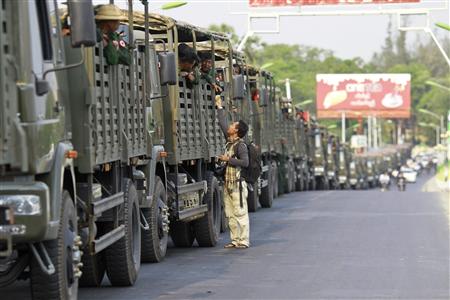Reuters

Reuters/Reuters - A local journalist hands a snack to a soldier in a vehicle in Meikhtila March 23, 2013. REUTERS/Soe Zeya Tun
MEIKHTILA, Myanmar (Reuters) - Hundreds of troops kept an uneasy calm in central Myanmar on Saturday after martial law was imposed to quell three days of bloody unrest between Buddhists and Muslims that is testing the country's nascent democracy.
The official death toll in the worst-affected town of Meikhtila stands at 11 dead, although local estimates put it as much as four times higher.
Burned corpses still lay uncollected by the roads on Saturday, said Reuters reporters in the city 540 km (336 miles) north of the commercial capital Yangon.
President Thein Sein declared a state of emergency in Meikhtila and three nearby townships on Friday after riot police and a dusk-to-dawn curfew had failed to stem violence triggered by an argument between a Buddhist couple and the Muslim owners of a gold shop.
"The violence and looting stopped suddenly as soon as the military arrived," said a Meikhtila police officer, who declined to be identified.
The unleashing of ethnic hatred, suppressed during 49 years of military dictatorship that ended in March 2011, is challenging the reformist government of one of Asia's most ethnically diverse countries.
That government has released jailed dissidents, held a free by-election and lifted censorship in Myanmar's historic democratic transition. But it has faced mounting criticism over its failure to halt deteriorating relations between Buddhists and Muslims.
Sending soldiers onto Myanmar's streets is potentially risky for a reformist government eager to distance itself from a military widely despised for its past human rights abuses, but violence-weary residents of Meikhtila supported the move.
"Even though I am Buddhist, I was not safe," said Khin Ktay. "I had to run away because I was afraid of the killings since I am living among Muslims."
Muslim resident Zaw Min Htay also welcomed martial law, although questioned why the government had taken three days to impose it. "If they had made this law in previous days, we would have gotten peace sooner," he said, echoing residents who said the police had not done enough to stem the violence.
Myanmar is a predominantly Buddhist country, but about 5 percent of its 60 million people are Muslims.
EVACUATION
A high-ranking police officer, speaking on condition of anonymity, told Reuters his officers had orders to disperse mobs armed with swords and sticks, but without using their truncheons.
The sudden ferocity of the rioting resembled last year's violence in Rakhine State in western Myanmar, which officially killed 110 people and left 120,000 homeless, most of them stateless Rohingya Muslims.
There, battles between the two communities turned into orchestrated attacks on Muslim communities by organized gangs of ethnic Rakhine Buddhists.
The Euro-Burma Office, a respected Brussels-based advocacy group, warned on Friday of a "Rwandan-like genocide" of Myanmar's Muslims.
Television footage from Meikhtila showed Muslims being evacuated under police protection amid jeering crowds on Friday.
About 2,000 people, mainly Muslims, remained under police protection at a sports stadium, said the officer, while several hundred Buddhists displaced by the unrest were sheltering at monasteries and police stations.
Among the property destroyed were 152 houses and 13 "religious buildings", reported the state-run New Light of Myanmar newspaper. "The public is urged to . . . expose those who led and attempted to instigate," it said.
So far, however, police in Meikhtila report few, if any, arrests.
Sectarian unrest is common in central Myanmar, also known as Burma, although reports were stifled under the military dictatorship.
"The problem for the authorities in Burma today is really how to protect lives, property and human rights without having to resort repeatedly to measures associated with the authoritarian governments of old," the Asian Human Rights Commission said in a statement on Saturday.
(Writing by Andrew R.C. Marshall; Editing by Sanjeev Miglani)
No comments:
Post a Comment